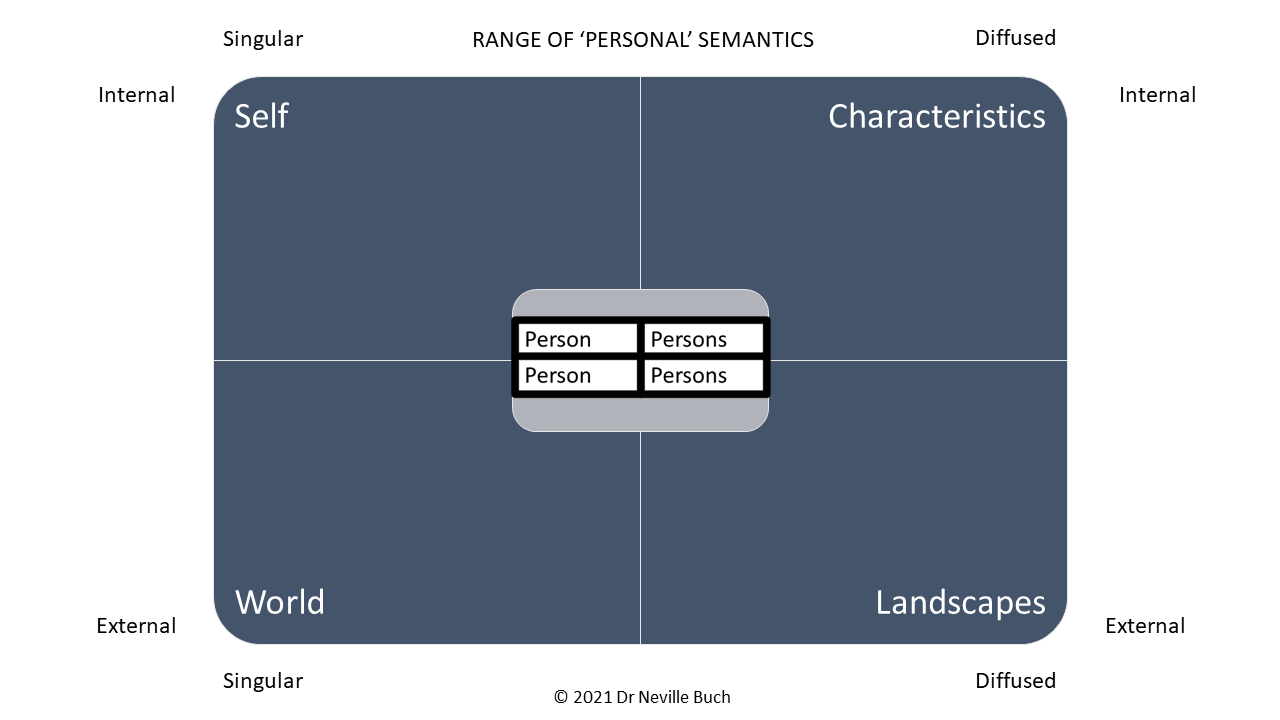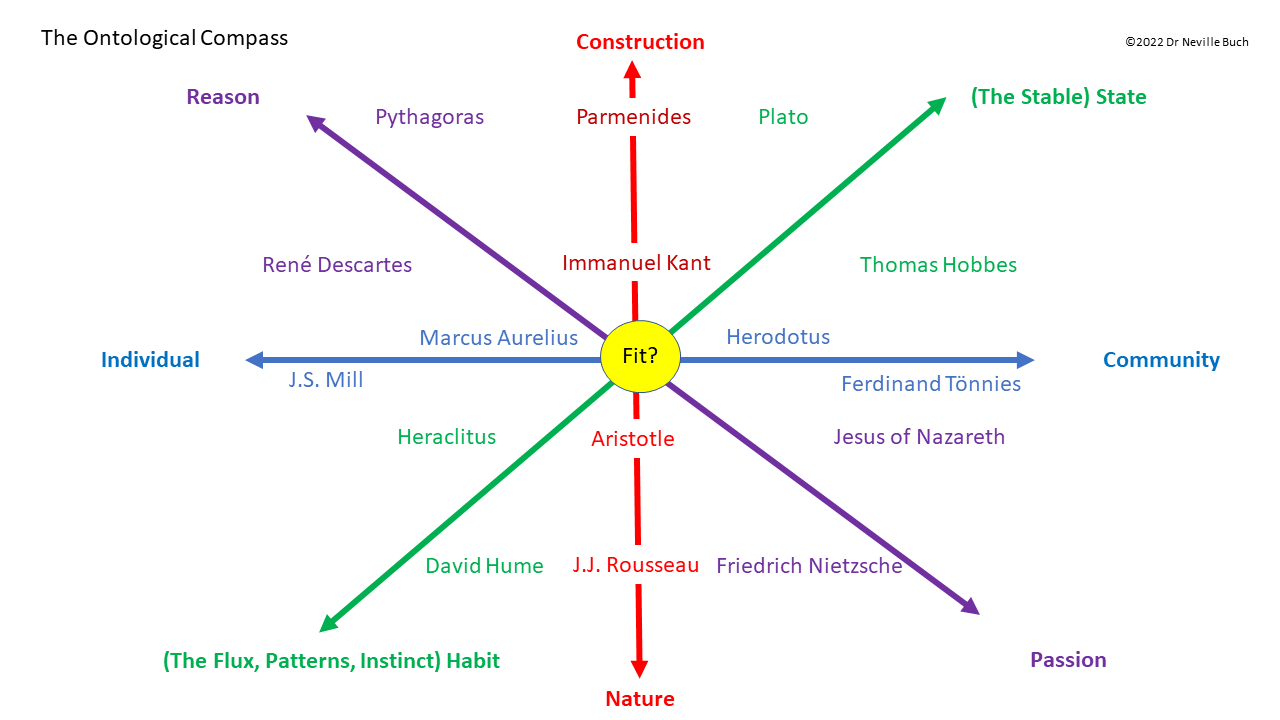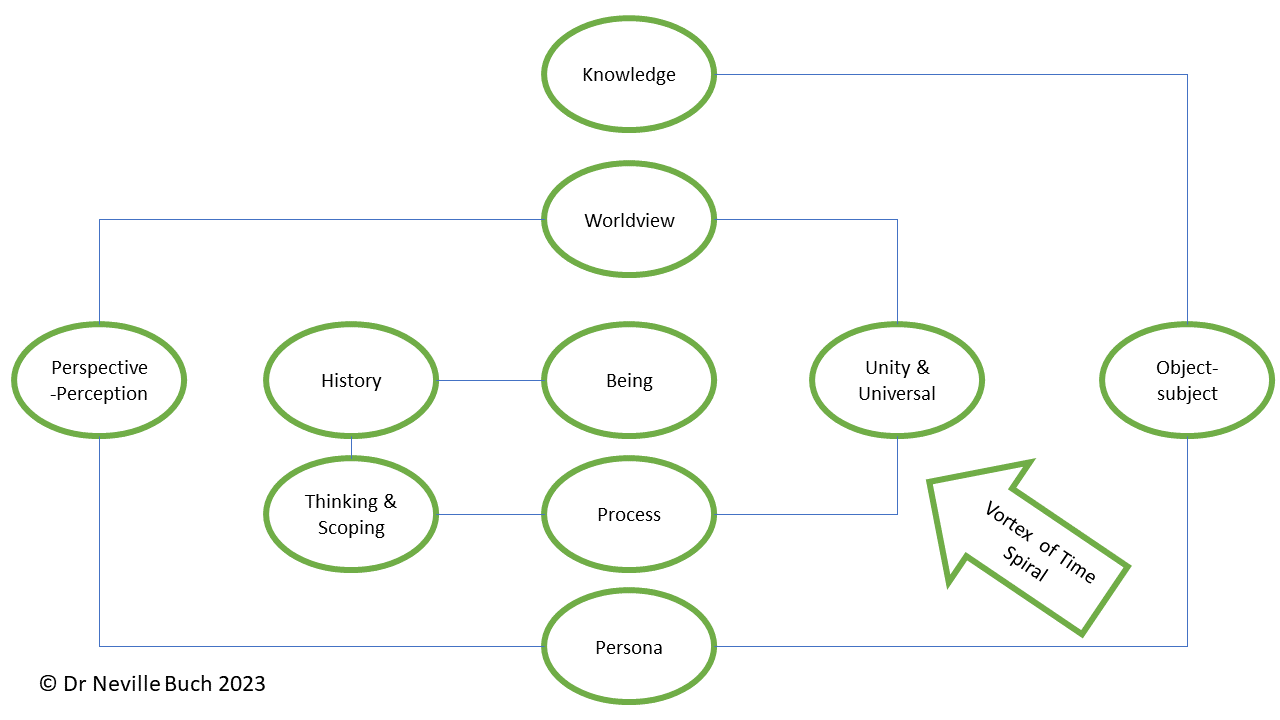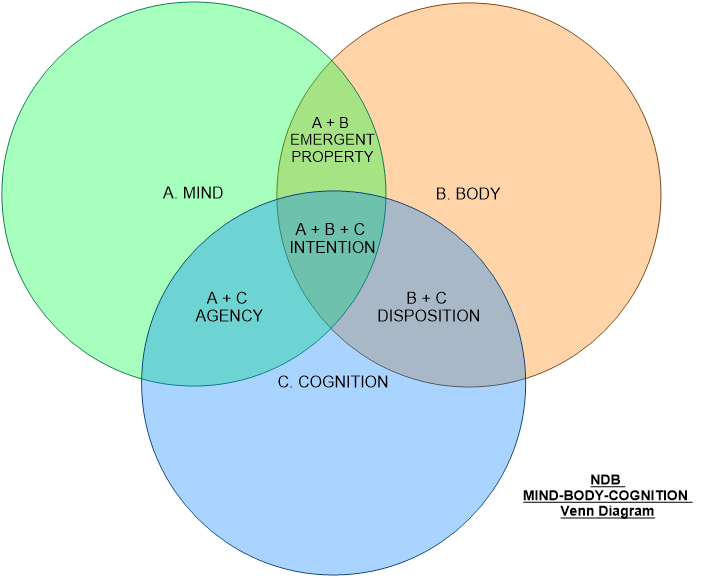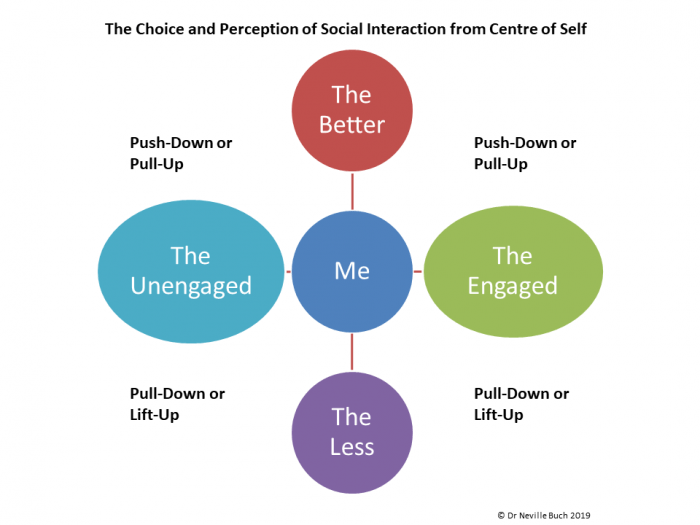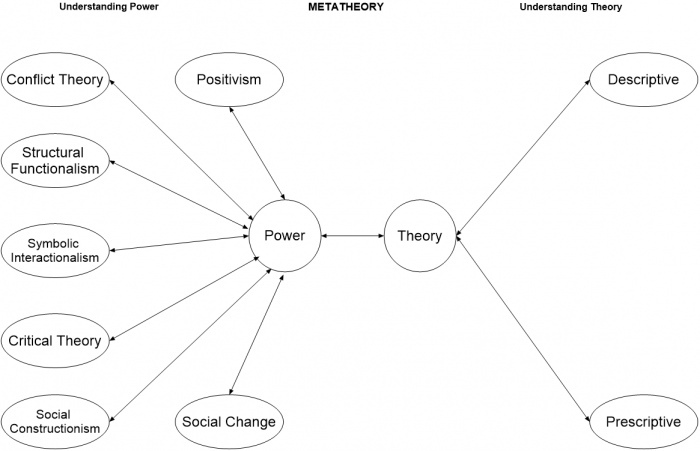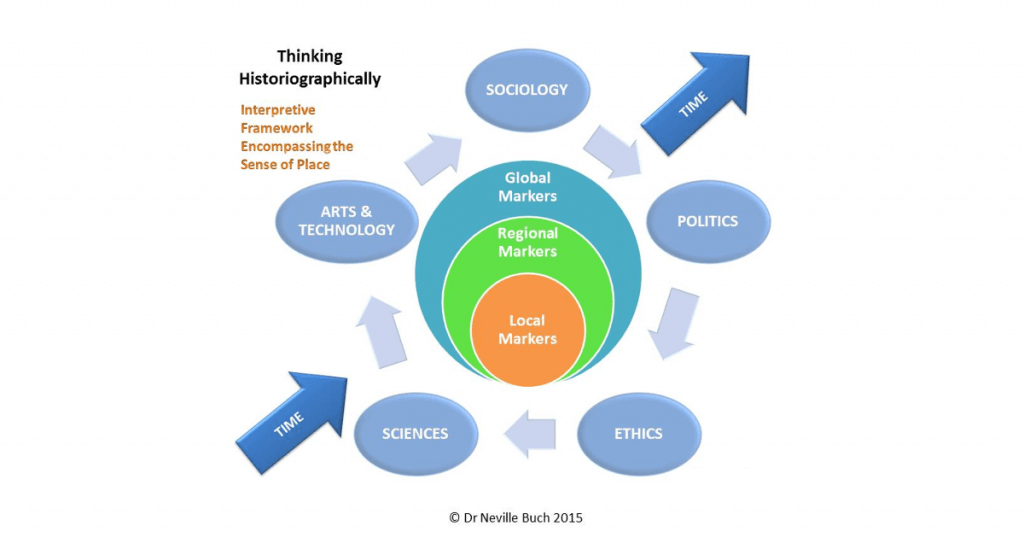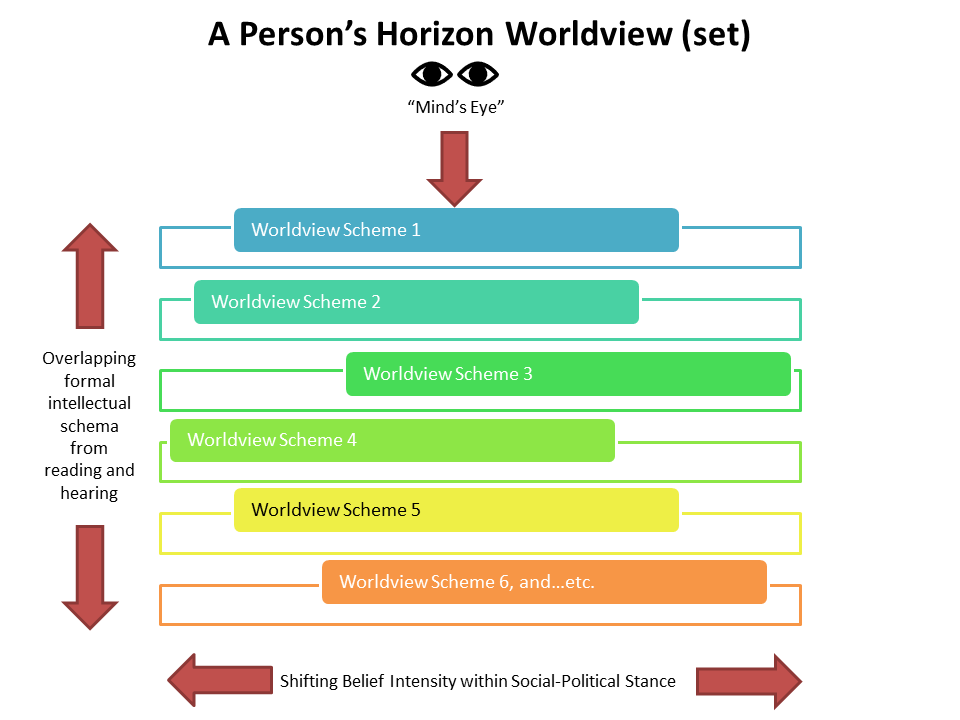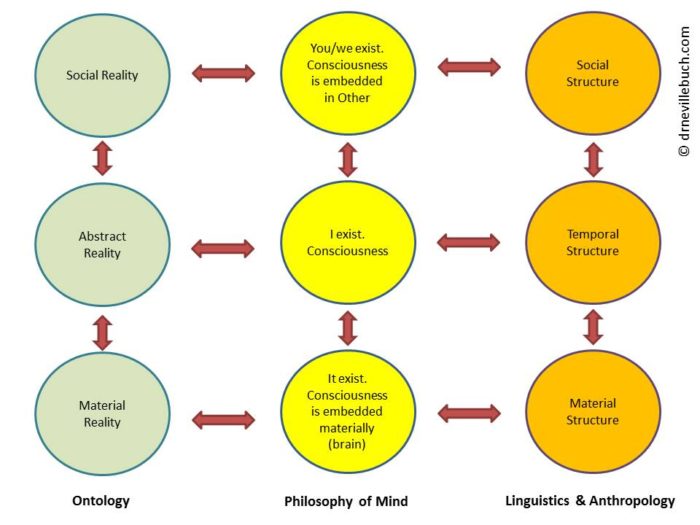Definitional phrasing copied and pasted from Wikipedia.
“genuinely reflecting on, and responding to, the needs, demands, and expectations of teaching about teaching within the academy”. John Loughran[1]
“The sociology of sociology is a topic of sociology that combines social theories with analysis of the effect of socio-historical contexts in sociological intellectual production.” (Wikipedia).
Intuition (insight)
(08). Range of Personal Semantics
Intuition is the ability to acquire knowledge, without recourse to conscious reasoning or needing an explanation.
Henri Bergson (1859-1941) argued that the processes of immediate experience and intuition are more significant than abstract rationalism and science for understanding reality. Note to poor readers, this does not claim that intuition is always correct or that a claim of intuition is necessarily true.
Intuitionism is a position advanced by L. E. J. Brouwer in philosophy of mathematics derived from Kant’s claim that all mathematical knowledge is knowledge of the pure forms of the intuition—that is, intuition that is not empirical.
Intuitionistic logic was devised by Arend Heyting to accommodate this position (it has also been adopted by other forms of constructivism). It is characterized by rejecting the law of excluded middle: as a consequence, it does not in general accept rules such as double negation elimination and the use of reductio ad absurdum to prove the existence of something.
Researchers in artificial intelligence are attempting to add intuition to algorithms, as the ‘fourth generation of AI’; this can be applied to many industries, especially finance. The researcher of this blog is skeptical that machines can reproduce organic functions.
Reasoning (internalism)
(14). The Ontological Compass
Reason is the capacity of consciously applying logic by drawing valid conclusions from new or existing information, with the aim of seeking the truth. It follows from intuitions.
Internalism and externalism are two opposite ways of integration of explaining various subjects in several areas of philosophy. These include human motivation, knowledge, justification, meaning, and truth. Internalism is the thesis that no fact about the world can provide reasons for action independently of desires and beliefs. Externalism is the thesis that reasons are to be identified with objective features of the world. The internal–external distinction is a distinction used in philosophy to divide an ontology into two parts: an internal part concerning observation related to philosophy, and an external part concerning question related to philosophy.
Rudolf Carnap (1891-1970) introduced the idea of a ‘linguistic framework’ or a ‘form of language’ that uses a precise specification of the definitions of and the relations between ontological entities. The discussion of a proposition within a framework can take on a logical or an empirical (that is, factual) aspect. W. V. Quine (1908-2000) disputed Carnap’s position from several points of view. His most famous criticism of Carnap was Two dogmas of empiricism, but this work is not directed at the internal-external distinction but at the analytic–synthetic distinction brought up by Carnap in his work on logic: Meaning and Necessity. Quine’s criticism of the internal-external distinction is found in his works On Carnap’s views on Ontology and Word and Object. Quine’s approach to the internal-external division was to cast internal questions as subclass questions and external questions as category questions. What Quine meant by ‘subclass’ questions were questions like “what are so-and-so’s?” where the answers are restricted to lie within a specific linguistic framework. Quine argued that there is always possible an overarching language that encompasses both types of question and the distinction between the two types is artificial.
A view close to Quine’s subclass/category description is called, conceptual relativity. To describe conceptual relativity, Hilary Putnam (1926-2016) pointed out that while the pages of a book are regarded as part of book when they are attached, they are things-in-themselves if they are detached. My nose is only part of an object, my person. On the other hand, is my nose the same as the collection of atoms or molecules forming it? This arbitrariness of language is called conceptual relativity, a matter of conventions. Thus, in this view, the Carnapian multiplicity of possible linguistic frameworks proposes a variety of ‘realities’ and the prospect of choosing between them, a form of what is called ontological pluralism, or multiple realities. The notion of ‘one reality’ behind our everyday perceptions is common in everyday life, and some find it unsettling that what ‘exists’ might be a matter of what language one chooses to use.
Sense and Reference (semantics, semiotics, symbolics)
15. Buch’s Philosophy and History
In the philosophy of language, the distinction between sense and reference was an idea of the German philosopher and mathematician Gottlob Frege in 1892 (in his paper, On Sense and Reference; German: Über Sinn und Bedeutung), reflecting the two ways he believed a singular term may have meaning. The reference (or ‘referent’; Bedeutung) of a proper name is the object it means or indicates (bedeuten), whereas its sense (Sinn) is what the name expresses. The reference of a sentence is its truth value, whereas its sense is the thought that it expresses. Frege justified the distinction in a number of ways.
- Sense is something possessed by a name, whether or not it has a reference. For example, the name ‘Odysseus’ is intelligible, and therefore has a sense, even though there is no individual object (its reference) to which the name corresponds.
- The sense of different names is different, even when their reference is the same. Frege argued that if an identity statement such as “Hesperus is the same planet as Phosphorus” is to be informative, the proper names flanking the identity sign must have a different meaning or sense. But clearly, if the statement is true, they must have the same reference. The sense is a ‘mode of presentation’ which serves to illuminate only a single aspect of the referent.
Much of analytic philosophy is traceable to Frege’s philosophy of language. Frege’s views on logic (i.e., his idea that some parts of speech are complete by themselves, and are analogous to the arguments of a mathematical function) led to his views on a theory of reference.
Projection (externality, ‘reality’)
(10). Buch’s Mind-Body-Cognition Venn
Projection is a movement of thought from the internal to externality in the framework of ‘sense and reference’. Externality goes to arguments about ‘reality’. In economics, an externality or external cost is an indirect cost or benefit to an uninvolved third party that arises as an effect of another party’s (or parties’) activity. Externalities can be considered as unpriced components that are involved in either consumer or producer market transactions. The author here is subject to externalities in this sense, as an unpaid scholar producing this teaching document.
The confusion that simple folk have about ‘reality’ is that philosophical realism may be any of the approaches in a long list of frameworks:
- Aesthetic realism (metaphysics)
- Agential realism (Barad)
- Australian realism
- Austrian realism
- Christian realism
- Conceptualist realism (Wiggins)
- Critical realism (disambiguation)
- Dialectical realism (Hacking)
- Direct realism
- Empirical realism
- Entity realism
- Epistemic structural realism
- Epistemological realism
- Hermeneutic realism (Heidegger)
- Internal realism, also known as “pragmatic realism” (Putnam)
- Local realism, the view held by the authors of the EPR paper
- Logical realism, the conviction the rules of logic are mind-independent
- Metaphysical realism
- Modal realism
- Model-dependent realism (Hawking and Mlodinow)
- Moderate realism
- Moral realism
- Naïve realism
- New realism (philosophy)
- Ontic structural realism
- Peircean realism
- Perspectival realism
- Platonic realism
- Quasi-realism
- Rational realism (Bardili)
- Realistic monism (G. Strawson)
- Realistic rationalism (Katz)
- Referential realism
- Relational realism
- Romantic realism
- Scientific realism
- Musgrave’s scientific realism
- Scotistic realism
- Semantic realism (epistemology) (a position criticized by Dummett)
- Semantic realism (philosophy of science) (Psillos)
- Semirealism (Chakravartty)
- Set-theoretic realism (Maddy)
- Speculative realism
- Subtle realism
- Theological critical realism
- Transcendental realism (Schelling, Schopenhauer, Bhaskar)
- Truth-value link realism (a position criticized by Dummett)
Simple folk, in their intuitive approach to ‘reality’ are prejudicious, i.e. pre-judgement, bias, in not understanding the options in comprehensive education. The State of Affairs for such a person, what they think, could be well true and correct, but there is no such knowledge until learning occurs.
Projectivism or projectionism in philosophy involves attributing (projecting) qualities to an object as if those qualities actually belong to it. It is a theory for how people interact with the world and has been applied in both ethics and general philosophy. It is derived from the Humean idea that all judgements about the world derive from internal experience, and that people therefore project their emotional state onto the world and interpret it through the lens of their own experience. Projectivism can (not necessarily) conflict with moral realism, which asserts that moral judgements can be determined from empirical facts, i.e., some things are objectively right or wrong.
Ludwig Feuerbach (1804-1872) famously developed this approach in relation to world systems beliefs. Feuerbach concluded, “If man [humanity] is to find contentment in God, he must find himself in God.” Thus, God is nothing else than human: he is, so to speak, the outward projection of a human’s inward nature. The approach became the framework of psychological projection, which is a defence mechanism of alterity concerning the internal content ‘mistaken’ to be coming from the ‘outside’ Other. The descriptor ‘mistaken’ alluded to the idea of illusion from Sigmund Freud (1856-1939); however, the alleged ‘illusion’ forms the basis of empathy by the projection of personal experiences to understand someone else’s subjective world. And furthermore, the illusion cannot be an illusion when truly is total and there is nothing to reveal the ‘mistake’. In the consciousness of the infinite, the conscious subject has for his object the infinity of his own nature. Human nature is probably not infinite, but the point is the internal projection from human nature which pushes it own demise aside into the unknown. If “fantasy”, it is fantasy which is ‘real’. There is no means to understand the state of our own demise.
Perspectivism (analytic disassembly; synthetic reassembly)
(05). The Choice Perception of Social Interaction
The reasoning of intuition and internalism involves perspective. In philosophy, epistemic perspective is a specific attitude or manner through which a person thinks about something. This figurative usage of the expression dates back to 1730. It is a point of view. Whereas propositional attitudes approach to analyse points of view internally, the ‘location/access’ approach analyses points of view externally, by their role. A propositional attitude is an attitude, i.e., a mental state held by an agent toward a proposition. Examples of such attitudes are ‘to believe in something’, ‘to desire something’, ‘to guess something’, ‘to remember something’, etc.
Perspectivism is the epistemological principle that perception of and knowledge of something are always bound to the interpretive perspectives of those observing it. While perspectivism does not regard all perspectives and interpretations as being of equal truth or value, it holds that no one has access to an absolute view of the world cut off from perspective. Perspectivism may be regarded as an early form of epistemological pluralism (but not necessarily). Early forms of perspectivism have been identified in the philosophies of Protagoras, Michel de Montaigne, and Gottfried Leibniz; however, its first major statement is considered to be Friedrich Nietzsche’s development of the concept in the 19th century influenced by Gustav Teichmüller’s use of the term, some years prior to Nietzsche’s writings. For Nietzsche, perspectivism takes the form of a realist antimetaphysics while rejecting both the correspondence theory of truth and the notion that the truth-value of a belief always constitutes its ultimate worth-value. The perspectival conception of objectivity used by Nietzsche sees the deficiencies of each perspective as remediable by an asymptotic study of the differences between them. This stands in contrast to Platonic notions in which objective truth is seen to reside in a wholly non-perspectival domain. Perspectivism is not a form of relativism; perspectivism doesn’t accede to an objective view of the world that is detached from our subjectivity, but it is still an approach which is ‘objectivity’ subjectively and asymptotically. Asymptotically means in an asymptotic way; in such a way as to approach a given value, point, level, etc., continuously without ever reaching it: “He applies similar reasoning to the problem of the moral perfectibility of humankind, which he believes can only happen asymptotically over time.”
Meta-Reflection and Meta-Theory (higher abstraction)
(04). Power-Theory
In what has passed in this blog essay, so far, is Meta-Reflection and Meta-Theory for the purposes of explanation and a little beyond description (but not escaping it). To explain is to have a set of statements usually constructed to describe a set of facts that clarifies the causes, context, and consequences of those facts. It may establish rules or laws, and clarifies the existing rules or laws in relation to any objects or phenomena examined. In educational theory, ‘Meta-Reflection’ is the teaching which no longer seen as simply transferring factual information, so educating teachers also requires a more sophisticated approach, based upon professional awareness that comes from reflective practice. For John Loughran, being a professional teacher educator requires “genuinely reflecting on, and responding to, the needs, demands, and expectations of teaching about teaching within the academy”.[2]
A metatheory or meta-theory is a theory on a subject matter that is a theory in itself. Analyses or descriptions of an existing theory would be considered meta-theories. If the subject matter of a theoretical statement consists of one or multiple theories, it would also be called a meta-theory.
Metalogic is the study of the metatheory of logic. Whereas logic is the study of how logical systems can be used to construct valid and sound arguments, metalogic studies the properties of logical systems. Logic concerns the truths that may be derived using a logical system; metalogic concerns the truths that may be derived about the languages and systems that are used to express truths. The basic objects of metalogical study are formal languages, formal systems, and their interpretations. The study of interpretation of formal systems is the type of mathematical logic that is known as model theory, and the study of deductive systems is the type that is known as proof theory.
Metaphilosophy is “the investigation of the nature of philosophy”. Its subject matter includes the aims of philosophy, the boundaries of philosophy, and its methods. Thus, while philosophy characteristically inquiries into the nature of being, the reality of objects, the possibility of knowledge, the nature of truth, and so on, metaphilosophy is the self-referential inquiry into the nature, purposes, and methods of the activity that makes these kinds of inquiries, by asking what is philosophy itself, what sorts of questions it should ask, how it might pose and answer them, and what it can achieve in doing so. It is considered by some to be a topic prior and preparatory to philosophy, while others see it as inherently a part of philosophy, or automatically a part of philosophy while others adopt some combination of these views.
The sociology of sociology is a topic of sociology that combines social theories with analysis of the effect of socio-historical contexts in sociological intellectual production.
ALL THE ABOVE (and more): Cognition (thought and emotion)
(01). Thinking Historiographically
All that has been stated so far operates as cognition. Cognition is the “mental action or process of acquiring knowledge and understanding through thought, experience, and the senses”. It encompasses all aspects of intellectual functions and processes such as: perception, attention, thought, imagination, intelligence, the formation of knowledge, memory and working memory, judgment and evaluation, reasoning and computation, problem-solving and decision-making, comprehension and production of language. Cognitive processes use existing knowledge to discover new knowledge. In cognition there is no ‘real’ separation between thought and emotion, and separation is an artificial devise for analytic purpose. In neuroscience – the scientific study of the nervous system (the brain, spinal cord, and peripheral nervous system), its functions, and its disorders – there is no functional separation between the parts and the whole system (being cognition).
PRODUCES Multi-layer Worldview Model and Personalism (‘everything’ internal to PERSONS)
(06). Mind’s Eye of a Personal Horizon Worldview
Cognition is the system, but more comprehensively in the humanities (thinking like humans; with social science), it is the Multi-layer Worldview Model and Personalism which is the outcome in knowledge. A worldview (also world-view) or Weltanschauung is the fundamental cognitive orientation of an individual or society encompassing the whole of the individual’s or society’s knowledge, culture, and point of view. A worldview can include natural philosophy; fundamental, existential, and normative postulates; or themes, values, emotions, and ethics. A model is an informative representation of an object, person, or system.
From another perspective, the knowledge outcome is consciousness – as awareness of internal and external existence – or persons – as a being who has certain capacities or attributes such as reason, morality, consciousness or self-consciousness, and being a part of a culturally established form of social relations such as kinship, ownership of property, or legal responsibility (personality).
In ontological terms (being), consciousness, persons, worldview come together as one with the only differences of language and references.
(11). Interrelation of Ideas on Consciousness and Reality
ENDNOTES
[1] Loughran, John (2014). ‘Professionally Developing as a Teacher Educator’; Journal of Teacher Education 2014, Vol. 65(4) 271–283(2014)
[2] Ibid.
Featured Image:
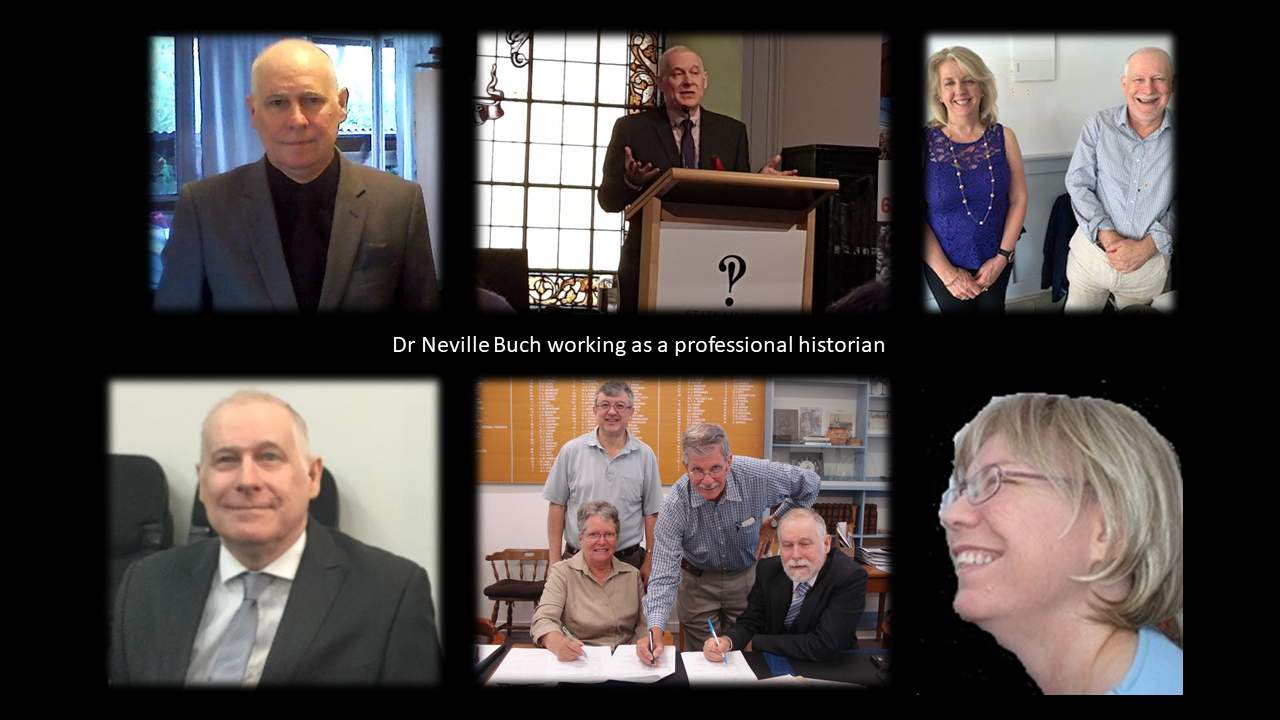
Dr Buch As A Professional Historian
Neville Buch
Latest posts by Neville Buch (see all)
- Failures in/on Higher Education Economics; the solutions are a start in policy reversal, against commodification - January 6, 2025
- Buch, Neville (2025). Free Thought. UU Underworld, January 2025, page seven - January 4, 2025
- Ontological Working Conclusions - January 3, 2025

